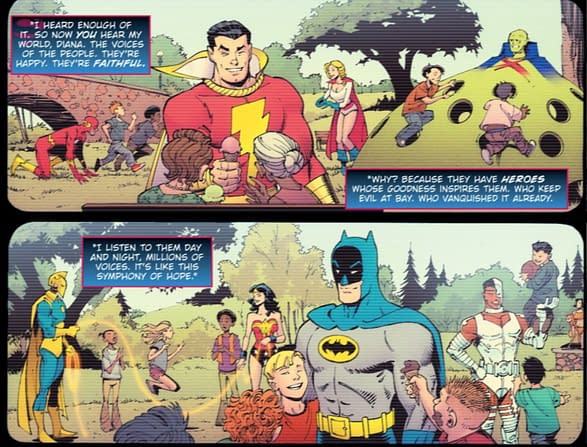In a commentary on DC Comics' Death Metal #4 on the Bleeding Cool site, Rich Johnston opines that it is an analogy to a "toxic fandom" that wants superhero comics to remain in the vein of the 1960s Silver Age, rather than advance to a more "mature" content.
The funny thing is, I think the "toxic fandom" are those who insist all comics must be written and drawn to their preferences, the adults who grew up reading superhero comics, graduated to other forms, and now want the characters of their youth to match their outlook. Trouble is, those characters were never meant to appeal to adults, other than as an escape from the real world, not as a reflection of it.
To want Superman or Batman or the Flash to be characters who deal in real-world adult problems, to be dark, grim, humorless is like wanting any other character originally aimed at youngsters, like, say, Doctor Dolittle, to mature along with its readership, so that now Hugh Lofting's gentle veterinarian is an organizer and protestor for PETA. All the joy, all the whimsy, all the fantasy is ejected in favor of dark realism--a world of "talk to the animals" overlayed with the horror of animals used to test cosmetics.
Yes, some stories aimed at kids grow with them. J.K. Rowling's Harry Potter series is a prime example--but the early books, with their more light-hearted approach, still remain for a new generation to start with and then progress into the later, darker, adventures. But the advocates of a "mature" superhero genre don't want their "realistic" heroes to be tainted by the existence of the versions aimed at a younger audience--or simply a readership that prefers a simpler, more classically heroic set of characters.
The proof that these readers are the true "toxic fandom"? Look at what has happened to sales of comics in the three decades since the publishers began catering to them.

No comments:
Post a Comment